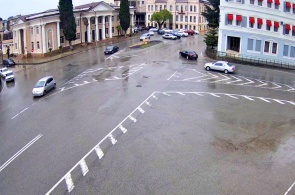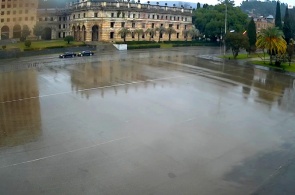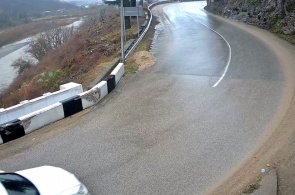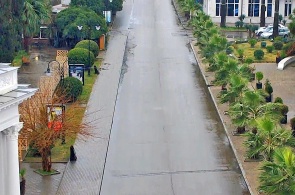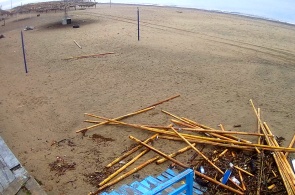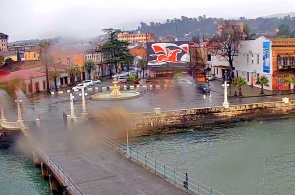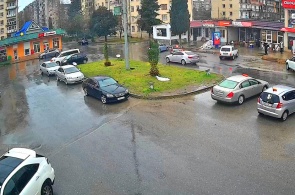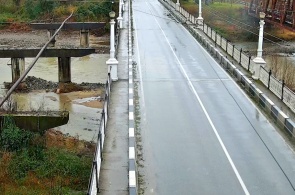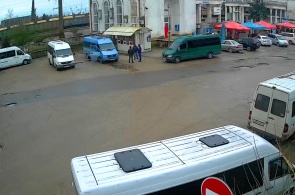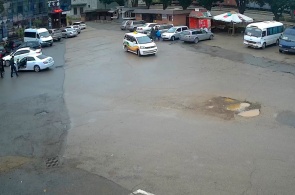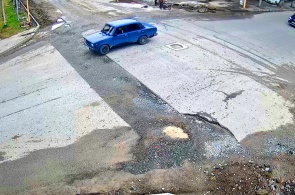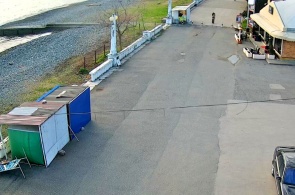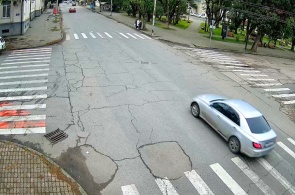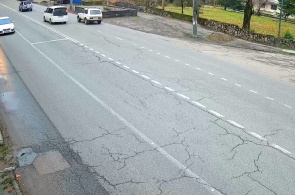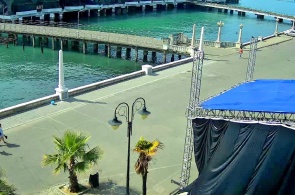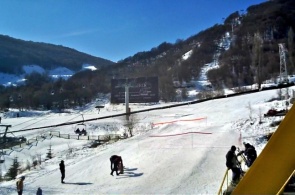The Sukhum webcam is installed on the Gumista bridge, which was built across the river of the same name.
This is one of the main bridges of Abkhazia, which connects the western part of the country with the capital. This building was built in the late 1940s. It suffered significantly during the Georgian-Abkhazian conflict.Sukhum, whose webcams allow you to enjoy a walk online, is one of the most popular Abkhazian resorts.
It is the capital and largest city of the country. Locals consider this place the soul of Abkhazia.One of the main attractions is the Sukhumi Monkey Nursery. In addition to being a popular tourist destination, it is a functioning scientific institution. The purpose of the nursery was to study human diseases with the help of monkeys. It was decided to build it here because the climate is similar to the native conditions of primates, and also because of the large number of fruits in the vicinity.
The official founding date of the nursery is August 24, 1927. On this day, baboons and chimpanzees were brought from Guinea. At the same time, 15 primates were bought in total, but only two pairs were able to endure the long journey. Over the next 3 years, more than a hundred monkeys appeared in the nursery. Among them were orangutans, chimpanzees, baboons, hamadryas. The mortality rate turned out to be too high, so only hamadryas survived and began to reproduce.
Scientists explained the death of great primates by several factors. The first is a stone gorge in which cold winds blew. The next - then the nursery was on the outskirts of the city, so human infections often penetrated. And the last factor is also related to the location - there was a highway nearby, the dust from which fell into the territory of the institution.
Nevertheless, this did not prevent the Sukhum nursery, whose webcams are available on the site, from developing a scientific direction.
In 1958, a primatology center was opened here, which became the base for the study of oncological diseases. In addition, about 12 macaques were trained for space flights. It also created and tested vaccines against poliomyelitis, measles, hepatitis, conducted research on new antibiotics and other drugs.During the Georgian-Abkhaz conflict, the nursery suffered significant losses. Out of about 2 thousand monkeys, only a few dozen managed to survive. To save the animals, some had to be sent to Russia.
Today, the monkey nursery is gradually being restored. Now there are about 300 primates. Most of them are rhesus monkeys.
This place in Sukhum, whose webcams allow you to enjoy the picturesque local nature, is worth a visit.
More details
Sukhumi webcam is installed on the Red Bridge. It was built in 1951. This structure crosses the Basla River. It got its name because it is painted red. Initially, the bridge was intended to connect the soldiers' barracks located on opposite sides of the river. At the same time, the bridge became famous during the Georgian-Abkhaz conflict, becoming the first line of defense for the troops of Abkhazia.
Sukhum, Abkhazia
04.03.22
Sukhum webcam is installed on Freedom Square. This is the main place in the city. Here is the building of the Council of Ministers of Soviet Abkhazia, which was destroyed during the Georgian-Abkhaz conflict. In 2008, more than 50 thousand people gathered here for the National Assembly.
Sukhum, Abkhazia
02.03.22
The webcam is installed on the Gumista bridge in the direction of Sukhum-New Athos. This structure was erected across the Gumista River. During the Georgian-Abkhazian conflict, this place was engulfed in fierce battles. In memory of those who died in the rocks that are along the road, marble plaques with their images are placed.
Sukhum, Abkhazia
28.02.22
Sukhum webcam is installed on the Ritsa hotel. The view in real time opens on one of the old streets of the city - the embankment of the Mahadzhirs. This is a very picturesque place of the Abkhazian capital. On the camera you can see white-stone columns built at the beginning of the 20th century. For more than a hundred years, this embankment has been a favorite place for citizens and tourists.
Sukhum, Abkhazia
26.02.22
Sukhumi webcam is located in the Mokko area. It is directed towards the beach "Medical", which is located in the eastern part of the city. The width of the beach is 40 m, and consists of pebbles and sand. Along the coast there are cafes and attractions.
Sukhum, Abkhazia
25.02.22
Sukhumi webcam is installed on the building of the sea station. In 1846, Sukhum became a trading port, and after 2 years it received the status of a "port city". Live broadcast shows the seaport and the embankment of the Mahadjirs. The lens captures ancient buildings, the central square, mountain peaks.
Sukhum, Abkhazia
24.02.22
Sukhumi webcam is located in a residential area of the city. Her overview includes houses and a small area outside the store. In real time, you can monitor what is happening on the street and weather conditions.
Sukhum, Abkhazia
23.02.22
Sukhum webcam is located on the Kelasur turn. In real time, you can see what is happening on the roads, as well as assess the weather conditions. The road leads to the southeastern suburb of the capital, the large village of Kelasuri. The name of the area was given by the mountain river Kyalasur.
Sukhum, Abkhazia
22.02.22
Camera overlooking the station square in the city of Sukhum (Abkhazia). The lens captures a spacious area near the old railway building. The device covers the parking of private passenger vehicles and taxis. Trains can be seen in the background. The broadcast is transmitted in real time.
Sukhum, Abkhazia
19.02.22
The webcam is set in the direction of the station square of Sukhum. The railway in Abkhazia was built in the 1930s. The first section was opened in 1940 from Enguri to the capital. A couple of years later, they launched a movement from Sukhumi to Adler. After that, trains began to follow the entire Black Sea railway line.
Sukhum, Abkhazia
19.02.22
The webcam is located in Abkhazia, namely in its capital - Sukhum. It is directed to the intersection of St. Ardzinba and st. Jonua. The broadcast is carried out in real time, the image quality is good. The intersection is completely visible. Thanks to the broadcast, you can resolve disputes in the event of an accident and observe the current situation on the road.
Sukhum, Abkhazia
16.02.22
The webcam is located at the intersection of the street. Voronov and the embankment of the Makhajirs, which is the oldest street in Sukhum. It was built at the turn of the 19th and 20th centuries. It is a picturesque and popular tourist spot. Walking along the street, you can enjoy the sea and ancient buildings.
Sukhum, Abkhazia
16.02.22
The webcam is located in Abkhazia, in its capital - Sukhum. It is directed to the intersection of St. Pushkin and st. Lakoba. The broadcast is conducted in real time, the quality is excellent. The intersection is fully visible, all pedestrian crossings are included in the review. In case of disputable situations on the road, video recording will be useful.
Sukhum, Abkhazia
13.02.22
The webcam is located in Abkhazia, the city of Sukhum. It is directed to the intersection of St. Eshba and st. Back. The broadcast is conducted in real time and in good quality. The traffic light is clearly visible. In the event of an accident or disputable situations on the road, the broadcast materials will be more than useful.
Sukhum, Abkhazia
12.02.22
Online webcam in the city of Sukhum on Bagapsha Square, the former square named after the Constitution of the USSR. S. V. Bagapsh Square is located in the historical center of Sukhum. From the south and south-east it borders the Makhajirov embankment, from the north-east and east there are buildings that are monuments of historical and cultural heritage.
Sukhum, Abkhazia
04.06.21
popular camerasshow all
Sultanahmet or Blue mosque is a work of art of Turkish-Islamic architecture. Its construction began in 1609, the construction work took seven years to a 19-year-old Sultan. The name of the mosque was, due to its interesting and unique finish.
Istanbul, Turkey
08.02.14
Stavanger, a town in the commune of Norway, located in the South-Western part of the country, on the Peninsula, rich in minerals. Tanager combines the influence of foreign organisations such as NATO and oil companies. The camera will shoot the harbour and the promenade of the city.
Stavanger, Norway
03.11.13
A webcam broadcasts the district of Tosmur - quiet location in the Eastern part of Alanya, located only five kilometres from the city centre. Its rural way of life and the beauty of untouched nature attract tourists.
Alanya, Turkey
10.11.18
Shark Island or in English of Shark island, located in the harbour city of Sydney, the suburb of Point Piper. The locals, the natives named the island Boambilly, which translated means Shark island. After all, this name is not casual, because it's mean and looks like a shark fin.
Sydney, Australia
31.10.13
The webcam is installed on site Alva. Tsaghkadzor ski resort town in Armenia. Tsaghkadzor is a beautiful mountainous area among deciduous forests, with a pleasant winter climate, and clean fresh air. The highest point is 1800 meters. The truss type is a classic, divided into three.
Tsakhkadzor, Armenia
18.01.14

